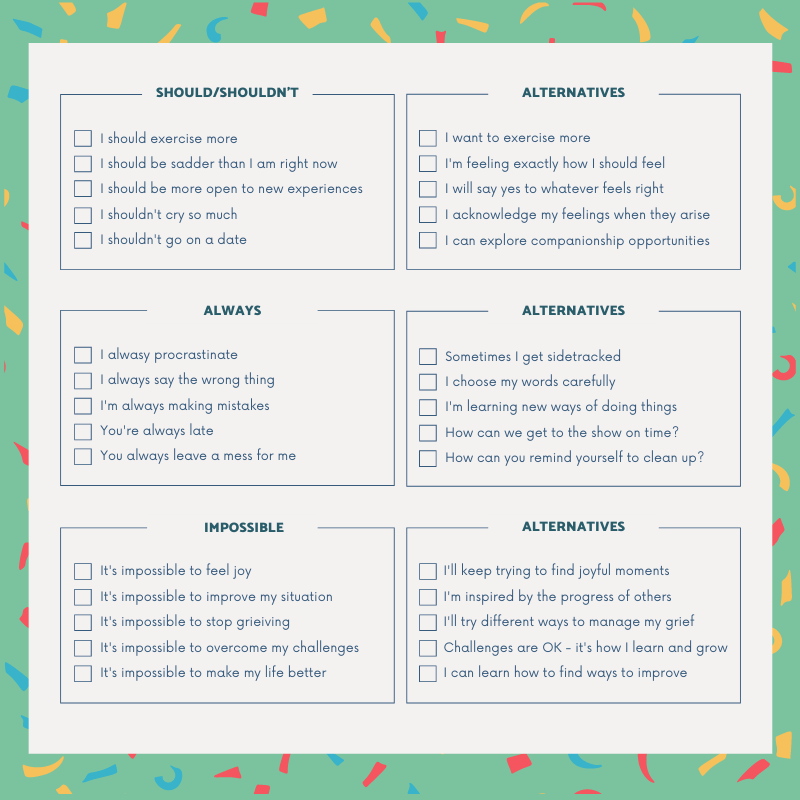Please Remove These Words From Your Vocabulary

Short and Sweet Summary: When you talk to yourself do you use kind, helpful encouraging words? Or do you use unhelpful words like can’t or never? If you’re using harmful words, please remove these words from your vocabulary. STAT. Your well-being depends on it.
What words do you use when you talk to yourself?
Are they pleasant words? Encouraging? Do they help you?
Or do you put limits on yourself and your potential because you use words that aren’t helpful? Definitely not nice. Words that are the opposite of encouragement.
Hmmnn…why are you using those words?
Oh, wait a minute…I know why!
Because they’re easy! Convincing yourself can’t do something or feel a certain way is super simple. It’s easy to throw your hands up in the air and say, “Oh well, I’m destined to live a life of misery because I can’t move forward after my husband’s death.”
The hard part is convincing yourself that you can. But you know what? You can do hard things. I know this. How do I know? Because you’ve been struck a hard and devastating blow. Your person died. And you’re learning how to pick up the pieces and move forward with grace and aplomb.
You’re already doing hard things.
When you stop trying to make things easy and agree that you’re willing to face challenges because that’s where you learn and grow, amazing things happen. You can move forward. You will be happy again.
But only after removing these hopeless, harmful words from your vocabulary. You owe it to yourself and your healing to talk nicer and use powerful, positive words instead.
CAN’T
Can’t is often so misunderstood. This poor word suffers from an identity crisis because it’s usually mixed up with “won’t.”
I mean, you can’t perform brain surgery if you’re not a brain surgeon. But when you say, “I can’t commit to a lunch out with my friends” what you really mean is you won’t.
Either way, the very act of telling yourself you can’t do something means you can’t do it. It’s pretty simple!
Let’s brainstorm a few ways to get rid of this ugly word.

Before we do that, though, let’s say you have a scheduling conflict that prevents you from committing to lunch. Should you say, “I can’t commit to a lunch out with friends,” because of the conflict? Nope. No. Don’t do it. You don’t want to train your brain to accept “can’t.” Not anymore.
What do you do then?
Instead of saying, “I can’t commit to lunch,” how about saying “I have a conflict on Tuesday, but I’m able to meet you on Friday instead.”
If you really don’t want to have lunch with your friends, that’s OK, too. However, be honest. Honor your needs in a way that isn’t deceptive to you or your friends. A simple, “Lunch out is more than I’m willing to commit to right now. When that changes, I’ll let you know.”
It takes practice, my widow peeps. The ability to remove these words from your vocabulary is harder than you think because we’re SO programmed to saying them.
The thing is, I have faith in you. You’ve conquered harder things. I know you can conquer this too. So, what does it look like when you remove “can’t” from your vocabulary?
You replace can’t with:
- How can I?
- I can…
- I will…
- I choose…
- I accept...
- I’m willing
HAVE TO
Your vocabulary dictates how you feel. When you use positive words, you feel more positive. When you use negative words you feel…well…negative. It’s not rocket science.
The phrase “have to” has a negative connotation, doesn’t it? It implies you must do something you really don’t want to do.
But what if you changed all of the “have to’s” into something else? Flipped the script from negative to positive? You’ll start seeing things from a different, more useful, perspective.
If you say, “I have to drive carpool and it sucks because I’m stuck in the car with loud teenagers” it sounds like an awful experience. I wouldn’t want to be stuck in that car!
However, when you say, “I’m so lucky I get to drive carpool and listen to the teenagers’ fascinating conversations” it becomes a more enjoyable experience. Because you “get to” drive them around. Not because you “have to.”
I don’t know about you, but I learn a tremendous amount as a quiet driver listening in to the conversations going on behind me! I’m only quiet now because my kids have asked me repeatedly to please stop asking their friends “embarrassing” questions. Turns out, I learn just as much being quiet as I do asking questions, so I shut my pie hole when necessary.
The next time you catch yourself saying, “I have to…” think about all of the things your spouse isn’t able to do anymore. Be grateful for the things you “get to” do.
Turn those “have to” moments into something exciting, informative, or otherwise beneficial.
NEVER
Never is a long time, isn’t it?
Out of all the words you should remove from your vocabulary this one is THE MOST IMPORTANT. The dreaded never should be permanently removed. No ifs, ands or buts about it.
The real reason is that you’re allowed to change your mind. As many times as you feel like. You can feel one way now and another way later. And it’s ALL good.
But when you throw that hideous “never” into the equation, you train your brain that any POSSIBILITY of a future event is off the table. Why? Why would you want to do that?
The biggest “never” widows say is, “I’ll never date again” or “I’ll never love anyone again” or even, “No one will ever love me again.”

Ugh. I’m crying over here. This is awful.
I don’t know about you, but I’m not psychic and I can’t predict the future. Can you predict the future? Probably not.
So why set limits on the POSSIBILITY of an event? Why shut down the potential to do any of those things ever again?
Never say never because it’s waaaaaaayyyyy too long. It goes on forever and ever. You won’t live forever and ever so embrace your opportunities when they present themselves.
Give yourself permission to open up to possibilities you may not even be able to see right now.

SHOULD/SHOULDN’T
Don’t you just love the shameful “should” and “shouldn’t” scoundrels?
Not.
Those two little rascals will keep you up at night with a laundry list of THINGS YOU MUST DO! Or THINGS YOU SHOULD NEVER DO! The fate of the world depends on it!
Listen, it’s far too easy to fall into the trap of what you think you “should” be doing because it takes the emphasis off of what you want. Maybe you don’t feel worthy of what you want or maybe you’re scared to voice an actual opinion about your wants and needs. So you talk yourself out of it with “shoulds” and “shoudn’ts” all over the place.
I used to write lists of what I should be doing. As if I wasn’t doing enough throughout the day of running my husband’s business, taking care of a house and kids, keeping social activities on the calendar, etc.
What the H-E-double-hockey-sticks…?
I did enough. I’m sure you’re doing enough. And we learn that we simply do what we can with the information we have at the time.
With that said, it’s time to let go of your Judge Judy internal dialogue and retire “should” and “shouldn’t” once and for all. If you really want to do something it won’t be prefaced with “should.” Let that be your warning that you’re trying to talk yourself into doing something that isn’t a priority or that you don’t agree with.
Repeat after me: only align yourself with your priorities.
Tell the shameful “should” and “shouldn’t” scoundrel in your head to take a hike and begin embracing the decisions that empower, not defeat you.
ALWAYS
Life is rarely black and white. There’s lots of gray in between to remind us we’re flexible and adaptable humans. Things aren’t “always” one way or another.
I don’t “always” procrastinate. Sometimes I do, but it’s not every day. I’m not “always” angry (although my kids beg to differ).
Yet, I catch myself saying always way too often. I need to get rid of this bad boy, like, right now. You with me?
We need to remove these crippling words from our vocabulary because they’re too critical and they make us inefficient. Just like I don’t “always” do one thing or another, neither do you. We can’t “always” be right or wrong.
As a widow, we’re constantly adapting to new circumstances and unfamiliar environments. Things literally change day-to-day so by definition we can’t “always” be doing something one way or another. So, let’s take “always” out of the equation and give ourselves a break from the inner critic who doesn’t even know what she’s talking about.
IMPOSSIBLE
Nothing is impossible.
I mean, really. Nothing.
If you want something bad enough, you’ll find a way to get it. If you don’t, you’ll use words like the ones listed above to prevent reaching your goal and claiming it’s “impossible.”
Here are the possible things you think are impossible:
- It’s possible to be happy again
- It’s possible to love again
- It’s possible to create a new life you love living
- It’s possible to change your thoughts and feelings
Should I go on?
Part of the devastation of early widowhood is the fear of the unknown. It’s scary to think of living life without your spouse. It’s hard to imagine going on and moving forward without a partner/co-parent/confidante. EVERYTHING seems impossible in the beginning.
Seems being the operative word.
Because after a while you realize you do get up every day. You do move forward. In fact, you start laughing again and smiling through your tears. Even though you feel grief on an inexplicable level and even though the pain sometimes feels unbearable, you bear it. So, you’re finding out that the things you thought were impossible at the beginning of your journey aren’t impossible at all.
Life shows you it’s possible to do whatever you thought was impossible because you’re already doing it.

WIDOW WRAP UP
Do you want to live in a peaceful, productive world or in a dark, miserable one? I’m guessing you’d rather be peaceful and productive. In which case you are willing to learn how to train your brain to say positive words instead of negative ones.
It takes practice. This isn’t easy. But you’re worth it.
When you remove these ugly, negative words from your vocabulary, you’ll start to see the difference in your outlook. When every “I can’t” becomes an “I’m willing” or “I’m able” or “I accept” amazing things happen.
But thinking about it won’t change anything. You have to consciously DO IT.
Click here if you’re on a roll and want to learn some other negative words you should remove right now!
